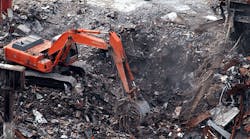Fourteen years later, 9/11 is still a major public health concern for the thousands of responders and survivors (area workers/residents/students) who were exposed to the health hazards in the aftermath of the World Trade Center (WTC) collapse on Sept. 11, 2001. Responders and survivors who were present in the impacted area still are developing illnesses related to their exposures and many have yet to enroll in the NIOSH-administered World Trade Center (WTC) Health Program.
It is estimated that 400,000 people were exposed to the WTC-derived contaminants in the days, weeks and months following the attacks. (Newman, DM. 2014. Protecting Worker and Public Health During Responses to Catastrophic Disasters- Learning From the World Trade Center Experience. American Journal of Industrial Medicine 57: 1295-98.). The WTC Health Program was established under the James Zadroga 9/11 Health and Compensation Act of 2010, enabling workers who participated in the rescue, recovery, clean-up, restoration and support services as well as those who were present, lived, worked or went to school in the area to receive no-cost medical screening and treatment.
There currently are over 72,000 responders and survivors receiving care from the WTC Health Program (WTC Health Program- Annual Status as of 6/30/2015 (2015, June 30). In WTC Health Program. Retrieved from www.cdc.gov/wtc).
While 9/11 was over 10 years ago, many workers and residents present in the impacted area (South of Canal Street for responders and South of Houston Street for area workers/residents) still are developing illnesses related to their WTC exposure. Symptoms of 9/11-related conditions include chronic cough, shortness of breath, sinus congestion, certain cancers, anxiety, depression, among many other symptoms and conditions.
For a full list of WTC-related health conditions, please visit www.cdc.gov/wtc. The WTC Health Program provides both physical and mental health services to treat WTC-related health conditions in the New York metropolitan area as well as throughout the United States. Physicians affiliated with the program can provide specialized healthcare for 9/11 responders and survivors across the nation. Responders who are not experiencing symptoms are still eligible for an annual monitoring exam through the program.
Liam Lynch is the program coordinator for the WTC Health Program for the New York Committee for Occupational Safety and Health (NYCOSH).For more information, call the WTC Health Program directly at 1-888-982-4748 or visit their web site or to connect with NYCOSH’s hotline on the program, call 855-498-2243.
